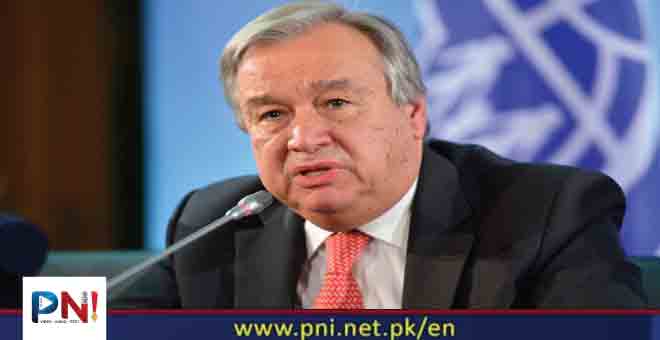UNITED NATIONS, May 24 (APP): United Nations Secretary-General Antonio Guterres has taken note of the International Court of Justice’s new order to Israel to stop its military offensive in the southern Gaza city of Rafah and to open the vital border crossing for aid, his spokesperson said, adding that the ruling was being transmitted to the UN Security Council for action.
ICJ’s “new provisional measures” follow a request from South Africa in a pending case accusing Israel of violating its obligations under the Genocide Convention.
Reading the new provisional measures in an open session at the court in The Hague, ICJ Justice Nawaf Salam announced that Israel must abide by its obligations under the Genocide Convention to “immediately halt its military offensive and any other action in the Rafah governate which may inflict upon the Palestinian group in Gaza conditions of life that would bring about its physical destruction in whole and in part”.
The court issued that decision by 13 votes in favour to two against.
During noon briefing at UN Headquarters in New York, Spokesperson Stephane Dujarric also said that the “Secretary-General recalls that, pursuant to the Charter and to the Statute of the Court, decisions of the Court are binding and trusts that the parties will duly comply with the Order from the Court.
Further, he said, the Secretary-General takes note of the Court’s order to Israel to maintain open the Rafah crossing for unhindered provision of urgently needed basic services and humanitarian assistance. “He also notes the Court’s instruction to Israel to take effective measures to ensure the unimpeded access to the Gaza Strip of investigative bodies mandated by competent organs of the United Nations to investigate allegations of genocide,” the spokesperson said.
ARAB REACTION
Meanwhile, Palestine’s U.N. ambassador Riyaah Mansour, speaking on behalf of Arab nations, said, “we expect the resolution of the ICJ to be implemented without hesitation – that’s mandatory.”
He told reporters Friday that Israel is a party to the International Court of Justice, the U.N.’s highest tribunal, “and the convention is crystal clear on this issue.”
“So Israel has to abide by the decisions and the demands from the ICJ,” he said.
Surrounded by ambassadors from Arab nations, Mansour welcomed the court’s provisional measures including demanding a halt to Israel’s military offensive in Gaza’s southern city of Rafah and the opening of Gaza’s crossing with Egypt to provide desperately needed humanitarian aid to hundreds of thousands of Palestinians.
He said the 22-member Arab group at the United Nations will do everything possible with the 120-member Nonaligned Movement, African nations and others to see the implementation of U.N. Security Council and General Assembly resolutions and ICJ rulings that among other things call for an immediate cease-fire in Gaza.
This is critical to save lives “and to allow our people to start attending to the wounds inflicted upon them by this aggression of Israel,” Ambassador Mansour said.
ISREAL’s VIOLATIONS
The ICJ new provisional measures came in response to South Africa’s request made on 10 May related to its initial accusations in December that Israel is violating its obligations under the Genocide Convention during the war in Gaza.
Israel’s military operations in Gaza have, to date, killed nearly 36,000 Palestinians, mostly women and children, and caused widespread destruction and a looming famine in the besieged and bombarded enclave.
Given the worsening conditions on the ground since Israel’s incursion into Rafah on 7 May, the court decided, also by votes of 13 in favour to two against, the new provisional measures shall require Israel to open the Rafah crossing for the unhindered delivery of urgent humanitarian aid and ensure unimpeded access for fact-finding missions to investigate allegations of genocide.
The Rafah border crossing, which has been the main entry point for aid to the enclave, has been closed since 7 May.
“The court is not convinced that evacuation efforts and related measures that Israel has affirmed to have undertaken to enhance the security of civilians in the Gaza Strip, and in particular those recently displaced from the Rafah governate, are sufficient to alleviate immense risks to which the Palestinian population is exposed as a result of the military offensive in Rafah,” Mr. Salam said.
In addition, the ICJ ordered Israel to submit a report within one month on steps taken to implement these provisional measures.
Justice Salam said the ICJ had noted that the situation in Gaza has deteriorated since it last issued provisional measures in March, adding that since Israel’s incursion into Rafah, the Najjar Hospital was no longer functioning and aid efforts have been impacted.
The court also noted that Israel’s evacuation orders for Rafah residents had led more than 800,000 people to flee to places like the coastal area of Al Mawasi, which lacked the basic essentials and services to accommodate them.
Since taking up South Africa’s case in January, the ICJ had already issued provisional measures in January and March by which Israel must, among other things, take all steps to ensure sufficient humanitarian aid enters Gaza.
However, UN agencies are reporting that scant aid is currently entering Gaza.
On Friday, Justice Salam recalled that in the two previous orders for provisional measures “the court expressed its grave concern over the fate of the hostages abducted during the attack in Israel on 7 October 2023 and held since then by Hamas and other armed groups, and called for their immediate and unconditional release.”
On Monday, the International Criminal Court (ICC), which is not a UN court, sought arrest warrants related to possible war crimes against three Hamas leaders and Israel’s Prime Minister, Benjamin Netanyahu, and Defence Minister Yoav Gallant. The request for the warrants are now being considered by the court’s judges.
Follow the PNI Facebook page for the latest news and updates.









